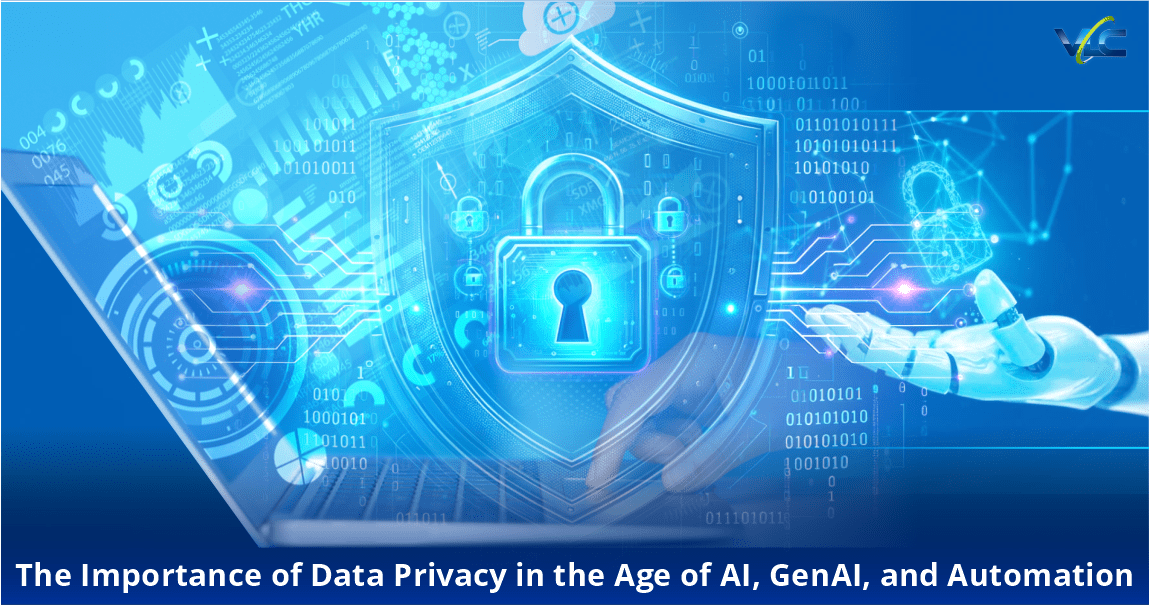The Importance of Data Privacy in the Age of AI, GenAI, and Automation
Data has emerged as one of an organization’s most important assets in an increasingly digital age. From customer information to business intelligence, data drives decision-making, innovation, and growth. However, with this immense value comes an equally significant responsibility: ensuring data privacy. As artificial intelligence (AI), generative AI (GenAI), and automation play larger roles in how data is collected, processed, and analyzed, the importance of data privacy has never been greater.
The Evolving Landscape of Data Privacy
Data privacy entails the safeguarding of personal and sensitive info from unauthorized access, misuse, or exposure. As technology changes, so do the challenges surrounding data privacy. AI, GenAI, and automation, while offering incredible benefits, also introduce new risks that organizations must address.
AI and Data Privacy
AI technologies depend on vast volumes of data to learn, make decisions, and provide insights. This data often includes personal information such as names, addresses, purchase histories, and even behavioral patterns. While AI can enhance customer experiences, improve operational efficiency, and drive innovation, it can also expose sensitive information if not managed correctly.
One of the critical issues with AI and data privacy is the potential for bias. AI models grasp from the data they are trained on, which means that any biases present in the data can be perpetuated by the AI. This can lead to discriminatory practices, particularly in areas like hiring, lending, and law enforcement. Ensuring that AI systems are trained on diverse and unbiased datasets is crucial to maintaining ethical standards and protecting individual privacy.
The Role of GenAI in Data Privacy
Generative AI, or GenAI, represents a new frontier in AI technology. GenAI systems are capable of creating content, such as text, images, and videos, that is indistinguishable from content created by humans. While GenAI offers tremendous creative potential, it also raises significant concerns regarding data privacy.
GenAI models require large datasets for training, which can include personal information scraped from the internet or provided by users. The use of such data raises questions about consent, ownership, and the potential for misuse. For instance, GenAI could be used to create deepfakes—realistic but fake content—that can damage reputations, spread misinformation, or violate individuals’ privacy.
To address these concerns, organizations must implement robust data privacy practices, ensuring that any data used for training GenAI models is anonymized, consent is obtained from users, and safeguards are in place to prevent misuse of generated content.
Automation and Data Privacy
Automation, particularly in data processing and analysis, has become integral to modern business operations. Automated systems can collect, store, and analyze vast amounts of data more efficiently than human workers. However, automation also presents unique challenges to data privacy.
One of the main issues with automation is the scope for data breaches. Automated systems can process large volumes of sensitive data, and if these systems are compromised, the consequences can be severe. Moreover, automated systems may lack the ability to recognize and respond to subtle privacy concerns that a human might detect.
To mitigate these risks, organizations must implement tight security initiatives, such as encryption, access controls, and continuous monitoring. Additionally, automated systems should be designed with privacy in mind, ensuring that data is only collected and processed for legitimate purposes and that individuals’ rights to privacy are respected.
Why Data Privacy Matters
The importance of data privacy cannot be overstated. As organizations increasingly rely on AI, GenAI, and automation, the potential for data misuse and breaches grows. Here are a few reasons why data privacy is critical:
● Legal Compliance: Data privacy regulations, such as the General Data Protection Regulation (GDPR) and the California Consumer Privacy Act (CCPA), impose strict requirements on how organizations handle personal data. Non-compliance can cause huge fines and penalties.
● Trust and Reputation: Customers are becoming more aware of their data privacy rights and expect organizations to protect their personal information. A data breach or misuse can severely damage an organization’s reputation and erode customer trust.
● Ethical Responsibility: Firms have an ethical responsibility to protect individuals’ privacy. Ensuring that AI, GenAI, and automation systems are used responsibly and transparently is key to maintaining ethical standards.
● Competitive Advantage: Organizations that prioritize data privacy can differentiate themselves in the market. With a commitment to privacy, businesses can forge stronger relationships with customers and gain a vantage point.
Best Practices for Ensuring Data Privacy
To safeguard data privacy in the era of AI, GenAI, and automation, organizations should adopt the following best practices:
● Data Minimization: Collect only the data that is required for the intended purpose and avoid storing unnecessary information.
● Anonymization and Encryption: Protect sensitive data by anonymizing it and using strong encryption methods to prevent unauthorized access.
● Transparency and Consent: Clearly communicate to users how their data will be employed and get explicit consent before collecting personal information.
● Regular Audits and Assessments: Conduct regular audits to identify potential privacy risks and ensure that data privacy measures are up to date.
● Employee Training: Educate employees about data privacy best practices and the primacy of fending sensitive information.
Partnering with VLC Solutions for Data Privacy Expertise
Proficiency in handling the intricacies of data protection is crucial, particularly when considering AI, GenAI, and automation. VLC Solutions is committed to assisting businesses with data protection and privacy law compliance. Our team of experts can help you create and put into practice strong data privacy strategies that support both your legal obligations and business objectives.
Don’t leave your data privacy to chance. Reach out to VLC Solutions today to learn how we can help you safeguard your data and maintain the trust of your customers.
